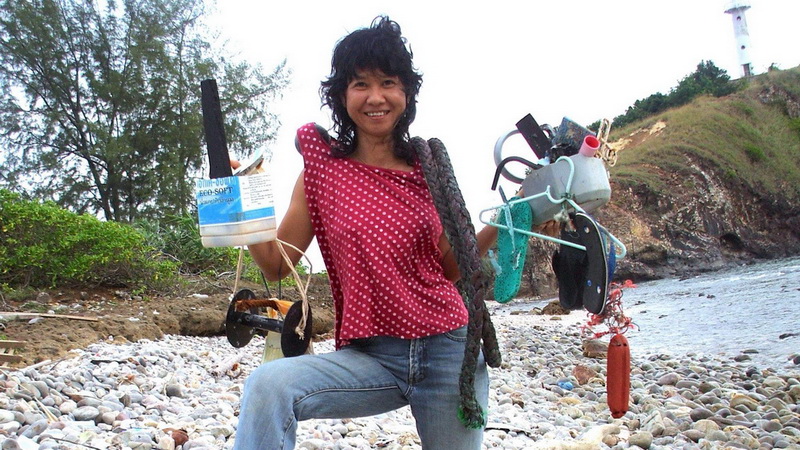Emerging from our collective lockdown into the new normal, many of us will notice that some things remain the same.
Our environmental challenges have not gone away and Thailand continues to struggle with plastic pollution, despite the much-celebrated move to outlaw plastic bags.
Of course, not all bags were banned; 75 of Thailand’s key retailers took part. When he launched the initiative, Minister of Natural Resources and Environment Varawut Silpa-Archa said the greatest challenge would be getting rid of the last 40% of bags given out at fresh markets and in rural areas.
Added to this are complications related to months-long lockdown. One month in, City Hall reported that the volume of plastic waste had exploded as people at home relied on home deliveries.
Huge numbers of contaminated face masks need to be properly disposed of due to both the obvious public health threat and damage they can cause to our environment.
So, as the country opens up, tackling both the economy and society’s wasteful attitude to plastic will be as vital as before.
Just before the virus hit, I sat down with six grassroots environmental change-makers to hear how the battle against single-use plastic has gone and what’s next to protect our environment from plastic peril.
Warawat “Bibb” Sabhavasu
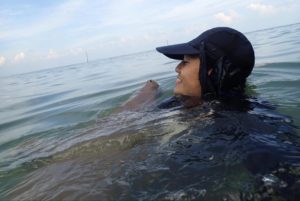
A passion for free-diving first turned Bibb on to the sheer amount of human detritus in our oceans. “All I ever saw was plastic,” he laments.
Bibb, 39, heads up the Bangkok chapter of Trash Hero, which organizes regular cleanups around the metropolis. “Around 80% of ocean plastic pollution starts out in the city, I want to stop the flow before it gets to the coast,” he says.
Social media is one of Bibb’s key weapons. “It enables individuals to make a real difference. Thais are addicted to it so it is central to changing attitudes,” he explains.
Mariam, the baby dugong who last year won and broke the nation’s hearts through viral videos, illustrates social media’s power.
Bibb volunteered to care for the orphaned sea cow on Koh Libong in Trang Province; tending to her in the ocean at night and watching her grow ill.
“We didn’t suspect plastic as the cause,” he recalls, “but when she died, vets found eight pieces blocking her intestine.” The news spread quickly online.
“Netizens were captivated by her cute persona, and her death by plastic tugged at our heartstrings.” Bibb believes that Mariam’s story encouraged the government to act with urgency to ban single-use bags.
“The ban raised public awareness, but it was not enough. These bags are just a fraction of the rubbish we collect at Trash Hero cleanups. We need to rethink our entire waste management system,” Bibb says.
Tara Buakamsri
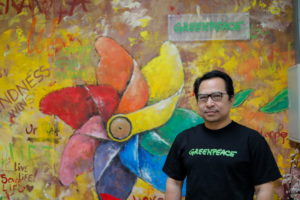
A founding member of Greenpeace SE Asia, Tara has worked with the advocacy group since 1998. He is now Thailand’s country director and helps orchestrate campaigns on plastic pollution.
“We put our energies into scientifically researching the impact of plastic on ocean going animals, and working out which kinds of plastic make up the pollution,” Tara explains.
The group enlisted the help of “citizen scientists” by teaming up with concerned businesses and local people to gather data on the problem to present to policy makers.
Tara viewed the bag ban as “an inspiring start,” but questions the effectiveness of making it voluntary rather than enforced.
The ban also needs support from education. “We need schools, and public awareness campaigns to help consumers connect their plastic use to the bigger picture,” Tara says.
He worries failure to properly explain the ban will lead to people resenting the inconvenience.
Tara would like to reframe the issue: “People need to feel happy and proud to be part of a change for the better, rather than resentful due to inconvenience.”
Marlena Wilson
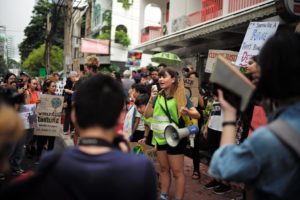
Marlena is in her final year of high school and describes herself as a student trying to make a difference. She runs Grin Green International, a school-based NGO with a mission to eradicate single-use plastics from Thailand.
“My job is to lead and inspire today’s youth to take action and create the change our world desperately needs. It is our future, a future which many adults may not even experience, and it scares me,” she says.
Grin Green International was behind the Plastic Bag Monster, a costume consisting of 700 plastic bags (the average number Thais were said to use in three months). Members took turns wearing it on awareness raising tours around the city.
A video of the monster’s first outing at a branch of 7-Eleven quickly clocked up tens of thousands of views.
Asked whether the monster can now be laid to rest, Marlena says they will kill it off only when Thailand truly commits to not using single use plastic.
“Walk into any convenience store and notice all the plastic packaging. Carrier bags are only the tip of the iceberg,” she observes. She called out the appearance of unbranded plastic bags – those printed without logos – that have been spotted at convenience stores since the “ban.”
Last year, the government announced a roadmap to tackle plastic waste by 2030. It included phasing out of bottle cap seals, microbeads and certain types of plastics that only break down into much smaller pieces.
This gives Marlena hope for the future, but she remains skeptical. “We have to see whether these promises are kept. As students we aim to hold the government responsible for their future actions or inactions,” Marlena vows.
Nanticha “Lynn” Ocharoenchai
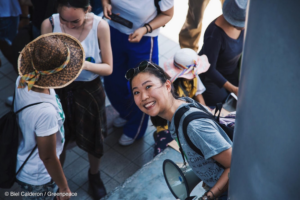
In 2017, bored in class, Nanticha Ocharoenchai, aka Lynn, began scrolling through her phone and found a profile about teenage climate activist Greta Thungberg.
“The article described Greta’s depression and anxiety caused by inaction on the climate crisis. I could totally relate. And wondered how hard it would be to create a Facebook event and go on strike.”
Freshly graduated, Lynn is the 22-year-old organizer of Climate Strike Thailand, which harnesses social media to bring people out to protest in support of action on climate change. She had organized four climate strikes prior to the pandemic shutdown.
Lynn hopes that the strikes will gain media attention, and drive the public (and in turn business leaders and government) to care more deeply about the climate crisis.
“When many people think of climate change, they think of plastic bags,” she says, “but the issue is much bigger than this.”
“Thailand has been stuck on the plastic issue for years. We need to focus on climate change because it is happening now. Our leaders are ignoring the consequences of current fossil fuel dependent policies,” Lynn says.
Chanin “Nammon” Srisuma
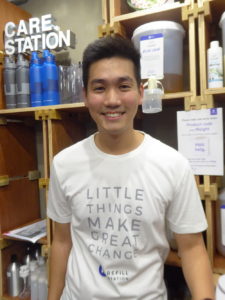
Chanin Srisuma is one of the faces behind Refill Station. Located near BTS On Nut, the shop and cafe allows shoppers to purchase essentials such as dry food, condiments and shampoo in pre-used containers brought from home.
A second branch sits inside BTS Ekkamai and will soon reopen after being closed for renovation during the lockdown. Nammon hopes the convenience of staying within the station itself will encourage more Bangkokians to shop waste-free.
“Apart from helping customers reuse plastic they already have, we are reducing plastic use in the system by returning bulky containers to our suppliers for refilling,” Nammon explains.
“I do not think plastic is bad, it’s a lightweight and durable material. But I want to encourage people to be more mindful about their use of it because once we take something from nature we should utilise it as efficiently as we can.”
Nammon says more businesses should factor in the environmental impact of what they do. “We need to look up and down our supply chains, figuring out what the costs are. Then business practices must change to lessen the burden on the planet,” he suggests.
Prasopsuk “Eco-Artist Pom” Lerdviriyapiti
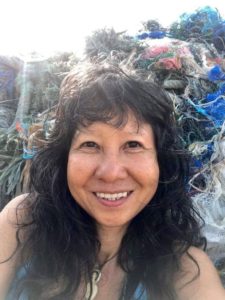
Prasopsuk Lerdviriyapiti, aka Eco-Artist Pom, has spent the last 15 years creating art to highlight the plastic tide engulfing Thailand’s seas.
Working in Phuket, she collects the plastic that washes up on the island’s beaches and uses it to construct mixed media outdoor sculptures, installations and costumes.
“I hope my art will connect people to the issues and help them think about protecting the environment and how to get the most out of nature’s resources,” she explains.
Pom is a survivor of the 2004 Tsunami, which was the initial inspiration for her art. “After the wave, I visited every one of Phuket’s beaches and witnessed not only the obvious human tragedy but also our abuse of the oceans,” she recalls.
The tsunami picked up rubbish and dumped it back onshore, spreading it everywhere and ruining the beaches. “I resolved to collect, and reuse it and show people that things lost at sea can still have value,” she explains.
Pom has watched the plastic issue gain traction globally and was not surprised when the government finally acted. “Although, this is not only Thailand’s problem, hopefully more countries will follow suit,” she says.
“I wish the plastic industry would take on more responsibility. We often blame consumers for buying the plastics forgetting the industry that made them in the first place,” the artist comments.
Environmentalists and their supporters will continue watching the authorities for real actions on plastic pollution and our wider environmental crisis. The hope is that green strategies will be central to the new policies needed to move Thailand on from the disruption caused by Covid 19.
Ewen Mcleish is a Bangkok based educator and writer for sustainability.
Clarification: This story has been updated with the preferred transliteration of Chanin “Nammon” Srisuma’s nickname.
